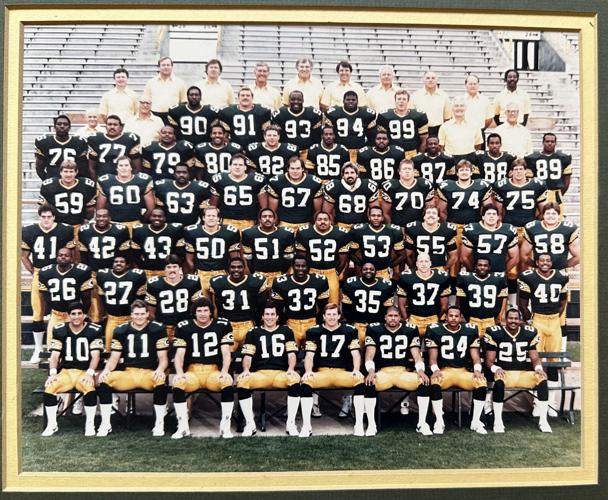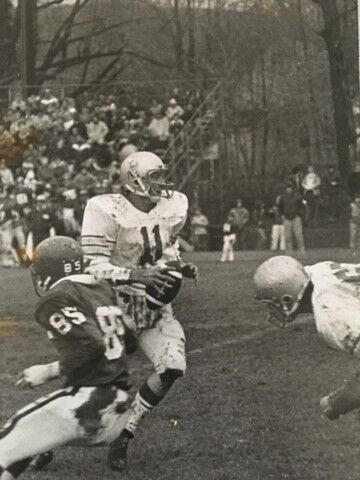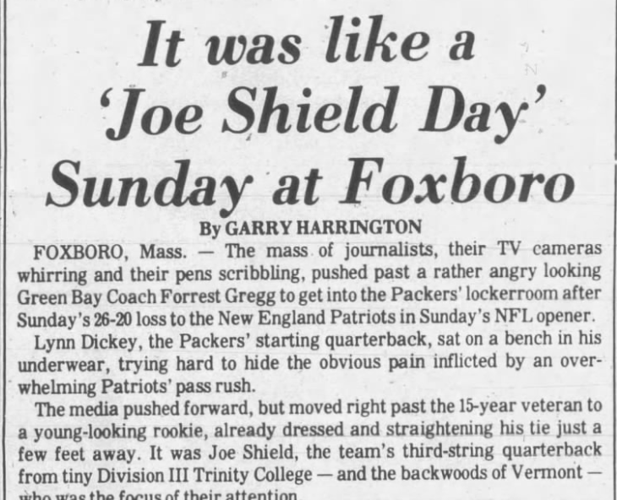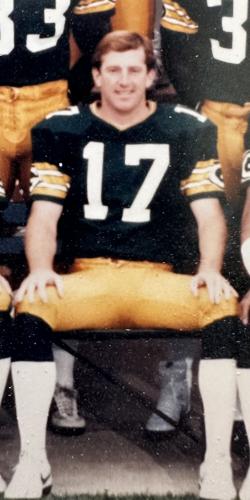AVON, CONN. — The eyes of the sports world are focused this weekend on Green Bay, Wisconsin, as the National Football League's (NFL) biggest offseason event, the draft, whets the appetite of fans, team officials and prospects alike.
Joe Shield will surely be watching with a mix of nostalgia and fascination — 40 years ago, almost to the day, the Brattleboro native was drafted by this year's host team, the Green Bay Packers, after a record-breaking career at quarterback for Trinity College in Hartford, Conn.
After getting drafted by the Packers in the 11th round in 1985, Shield made the team in 1985 and 1986, becoming the first person from Vermont to be drafted into the NFL and then make a team's roster. He also played briefly (in the 1986 preseason) with the New England Patriots.
But he said his thoughts this weekend will more likely center around his experience at Trinity, and how it shaped his post-football life.
“I do follow the NFL draft, but at this stage I still take particular focus and pride on the student-athlete experience at Trinity College, which has stayed the same throughout the years," Shield said this week by phone from his home outside of Hartford. "It is a very successful football program, but focused on the student experience first through academics, internships and overall mentoring for transition into the real world. Individuals take the lessons learned from the experience in the football program — such as hard work, discipline, resolve, teamwork, collaboration, bouncing back after setbacks — and apply them throughout the rest of their lives. This is still the same experience at Trinity as it was 100 years ago. I take great pride in that.”
He's also proud of his experience growing up in Brattleboro. Shield was a three-sport athlete at Brattleboro Union High School, playing baseball, basketball and football. He was the All-Southern Vermont League quarterback for two consecutive years (1978 and 1979). As a junior, he took the Colonels to the 1978 state championship game. He was selected to the Vermont Shrine team in '79 and guided Vermont to a rare win over New Hampshire, throwing a late-game touchdown pass.
He was also a solid contributor to the basketball program for two years, and a major factor (with a career .400 batting average) in the baseball team reaching the state championship game three straight years, including winning the state title in 1978.
Growing up in Brattleboro, Shield said some of the people he was around at the time helped shape his work ethic and greatly contributed to his athletic success.
“During early childhood my family lived on Laurel Street, which was in the shadow of Harris Hill Ski Jump. The people in that neighborhood were some that I truly looked up to, and was inspired by for years to come. For example, around the corner on Spruce Street was the Galanes family. Older brother Jim and his training partners became Winter Olympic endurance athletes, but in the summer, Southern Vermont would become a training ground for them, on our roads. You could witness first-hand the intensity of their training and preparation."
Shield said he also benefited greatly from his coaches at BUHS, which included Darrell Sawyer, Carl Tenney, Bill Holiday, Ralph Momaney, and Butch Lapan. He also said the presence of Andy Natowich and Al Libardoni played a significant role in his progress as an athlete.
"They were coaches on the field, where they taught us to be smart, to be tough, to have resolve, and to play hard. But more important, they were also life coaches. Although it was important to win, it was the way we prepared, played the game, persevered through adversity, stayed together as a team, and conducted ourselves, that was most important to the coaches. The character of their teams was always at the forefront.
"No matter the team record at the end of the season, one thing that was always consistent was how teams prepared and how they conducted themselves, how they represented the team, the school and the town. And I believe that is a wonderful underlying and shared experience for everyone that was involved in athletics at BUHS, no matter what sport they participated in. It truly was the cornerstone, but it started with family — parents, siblings, extended family. My parents always emphasized to listen and respect what the teachers and coaches were emphasizing in the school system, but the lessons were essentially an extension of what we were hearing at home as well."
Shield attended Worcester (Mass.) Academy for one year, where he excelled as the football team’s quarterback and as a baseball player. At Trinity, in the first quarter of the first game of his freshman year, the starting quarterback was injured, giving Shield an opportunity that he never relinquished. He completed 476 passes for 6,646 yards and 52 touchdowns in four seasons, school records which all stood until just recently.
Shield was the 1983 New England Collegiate Division II and III Football Offensive Player of the Year and co-captain of the Trinity football and baseball teams.
During his junior year in college, Shield said he began drawing interest from scouts for Major League Baseball and the NFL, but it became obvious that football was the sport where he would most likely continue his athletic journey. The year before he was drafted, Shield said he was invited to the scouting combine in Tempe, Arizona.
“That was an indication that I was very much on their radar. They would invite I think 15 quarterbacks nationally there and I think I did very well,” Shield said. “You kind of have a sense of where you stand athletically, at least, with some of the other quarterbacks and then once the combine was over that’s when more teams were coming to scout me and work me out at Trinity (College) in the winter of that year.”
The 1985 NFL draft was held over two days, April 30 and May 1, at the Omni Park Central Hotel in New York City. Unlike the present day, when each round is televised live and each pick dissected meticulously, the draft was a low-key affair. Shield spent draft day at Trinity, and there was no media present.
"We went over to the (Trinity) Athletic Center, and I was with the coaches and so forth. I wasn't expecting to go in the first few rounds, and then the day progressed, and eventually I got the call from (Packers head coach) Forrest Gregg. He kind of let me know that I was selected, and welcomed me to the Packers, and then turned me over to a travel coordinator because I had to be at mini-camp in Green Bay two days later."
Shield said it was surreal to step on to the legendary "frozen tundra" of Lambeau Field for the first time — though it was far from frozen in early May. "That was a real experience. Yeah, a lot of legends played there."
Training camp was another "real experience" for a rookie from a Division III college program. Shield said Gregg and offensive coordinator Bob Schnelker created a very tough, demanding environment, with six weeks of double sessions every day.
"There was a lot of learning the system, a lot of new plays coming at you that you would have to thoroughly understand," he said. "So it was constantly learning the new, reviewing and studying the old, but also acclimating to the overall speed of the players. It's a faster game than in college, so there was the challenge to step up and be efficient, to be able to anticipate. So you had to process the information, but you also had to step up your physical game. I kind of carried it from the meetings and practice field to the (preseason) games when you're under duress, to make sure that you're still within the framework of the offense and making things happen."
During the 1985 preseason, Shield battled Scott Brunner and Randy Wright for the backup quarterback position behind Lynn Dickey. After Brunner was traded, a couple days before the final cuts, Gregg pulled Shield aside and told him he made the team as the third-string quarterback.
Shield suited up, but did not play, in the Packers' season opener against, ironically, the Patriots, the team that he had grown up rooting for. Over 100 people, including family and friends, attended the game in Foxboro, Mass. to support Shield.
Even Gregg was amazed by the interest shown in his third-string rookie, according to Reformer sports reporter Garry Harrington. "Expecting more questions about the team's poor showing (a 26-20 loss) ... Gregg was instead besieged by questions about Shield's progress so far," Harrington wrote. "'I can see where I am,' the coach said."
Shield became the odd-man-out when the Packers, feeling they needed a veteran presence at the position, signed free-agent Jim Zorn, who had played extensively with Seattle. Shield was released by the Packers after the third game of the season.
He drew interest from the Patriots in 1986, and entered the preseason that year fighting for the third-string quarterback spot. Unfortunately he suffered a leg injury during a preseason game and was placed on injured reserve. After being released by the Patriots in September, he signed back on with the Packers and played in several games, taking the field as a holder for field goals and extra points. He was released during the offseason after the Packers acquired a few rookie quarterbacks, including top draft pick Don Majkowski.
Though the Packers expressed interest in him again as a replacement player during the 1987 NFL players strike, Shield felt it was time to move forward with his post-football life.
"I always worked extremely hard in school because you never know what's going to happen," he said. "Making it to the NFL was a goal of mine, a dream of mine. I just loved being part of the Packers organization. I really appreciated the tradition and the legacy that included coach Gregg. I thought very highly of him and the coaching staff, as well as the whole organization, as well as the fans. But at that point it was about trying to determine what I wanted to do for the rest of my life."
Over the past 30-plus years, Shield has been in the health care technology/informatics industry, working with hospitals in various client services roles. He lives and works in Connecticut with his wife of 37 years, Lori. The couple has two grown children.
Shield said he maintains a close connection to Vermont. "My mother and my aunt still live in town, so I'm quite frequently visiting them. My wife and I love to ski, and the boys love to ski. So we're in Vermont pretty frequently."
Shield was inducted into Trinity’s inaugural Athletic Hall of Fame (2019) as a football and baseball player. He is a member of the BHS/BUHS Athletic Hall of Fame’s Inaugural Class of 2020, and was inducted into the Vermont Principals Association Hall of Fame in 2023.
He takes great pride in his athletic accomplishments and doesn't regret his limited opportunity at the NFL level.
"Sometimes you look back and it's hard to believe it's been 40 years, because time just passes so fast," he says. "I have absolutely zero regrets. You know, I prepared and worked as hard as I could. It was a childhood dream to be (in the NFL) and I got there. I would not have changed a thing."











